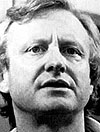One of Britain's most acclaimed directors, John Boorman is known for making films resplendent with great visual flair and taut narrative. Boorman is also known as one of the commercial mainstream's most independently minded directors. He has been quoted as saying, "filmmaking is the process of turning money into light and then trying to turn it back into money again," an epigram that has in many ways defined the trajectory of his career
A native of London, where he was born January 18, 1933, Boorman began his media career as an editor for the BBC. By 1962, he was the head of the Bristol BBC documentary unit. Three years later, he directed his first fictional film, the whimsical, loosely structured Having a Wild Weekend, which starred the Dave Clark Five. The film was distinctive and original enough to earn Boorman recognition as an innovative stylist by a number of prestigious publications.
Following more work for the BBC, Boorman made his Hollywood directing debut in 1967 with Point Blank, starring Lee Marvin as a gangster obsessed with getting revenge on the Organization that once wronged him. The film was seen as an elegant exploration of the increasing de-personalization of life in the modern urban world. It also went on to become recognized as one of the definitive Hollywood films of the late '60s, occupying a place in the groundbreaking Hollywood New Wave next to such classics as Bonnie and Clyde.
Boorman collaborated again with Marvin on the allegorical Hell in the Pacific (1968), which cast the actor as a WWII soldier stranded on an island with a Japanese soldier (Toshiro Mifune). He then made Leo the Last (1970), a surreal tale of London culture clash starring Marcello Mastroianni as an Italian aristocrat living in London's Notting Hill neighborhood. The film earned him the Best Direction award at Cannes.
Deliverance, Boorman's 1972 follow -up to Leo the Last, was a nightmarish meditation on the inefficacy of social constructs and civilized niceties in the face of primal squalor. The film was hailed for its depictions of the dark realities of human nature and oppressive machismo. Nominated for three Oscars, including Best Picture and Best Director, the film quickly became a classic, with its scenes involving a banjo duel with an inbred Appalachian child and Ned Beatty's rape by a pair of backwoods rednecks recognized as some of cinema's most memorable.
Boorman's next projects were the Sean Connery vehicle Zardoz (1973), Exorcist II:The Heretic (1977), and the acclaimed Excalibur (1981).A brutal, visually lavish adaptation of Malory's Morte d'Arthur, the film enjoyed a warm critical and commercial reception and earned a number of honors, including a Golden Palm nomination for Boorman at Cannes. Following the success of Excalibur, Boorman did not direct again until 1985, when he helmed The Emerald Forest, a story of a man's tireless search for his son who disappeared into the Amazon rain forest when he was seven. Earning high marks for its ravishing scenery, the critics extolled his use of impressive visuals.
Boorman’s incredible narrative strength came back to the forefront with Hope and Glory (1987). The surprisingly gentle, semi-autobiographical account of a boy's experiences during the London Blitz, it was hailed for its unforced exuberance. It was nominated for 5 Oscars including Best Picture, Best Director and Best Screenplay, and won a Golden Globe for Best Picture as well as many other awards. He followed it with Where the Heart Is (1990), and then I Dreamt I Woke Up (1991), a critically acclaimed short film that recounted the highs and lows of Boorman's career.
Following the short Two Nudes Bathing and Beyond Rangoon, both 1995, Boorman directed The General in 1998. The story of legendary, real -life Irish crime lord Martin Cahill, it featured an extraordinary performance by Brendan Gleeson in the title role, and was hailed as Boorman's best film in years. The director, who had his own real-life encounter with Cahill when the latter robbed his house years earlier, won the Best Direction award at Cannes for his work, almost 30 years after winning the same award for Leo the Last.
With an all-star cast, Boorman’s foray was The Tailor of Panama, a new breed of contemporary spy thriller based on John le Carré’s hit 1996 book. Boorman once again found himself a new forte: sophisticated entertainment that engages our intellect above our emotions.
Studio Eight Productions
